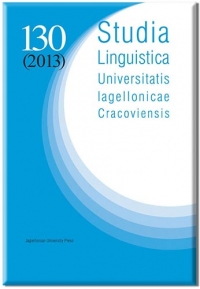LEXICAL HYBRIDIZATION OF ENGLISH AND GERMAN ELEMENTS: A COMPARISON BETWEEN SPOKEN GERMAN AND THE LANGUAGE OF THE GERMAN NEWSMAGAZINE DER SPIEGEL
LEXICAL HYBRIDIZATION OF ENGLISH AND GERMAN ELEMENTS: A COMPARISON BETWEEN SPOKEN GERMAN AND THE LANGUAGE OF THE GERMAN NEWSMAGAZINE DER SPIEGEL
Author(s): Jaime W. HuntSubject(s): Theoretical Linguistics, Morphology, Lexis, Comparative Linguistics, Evaluation research
Published by: Wydawnictwo Uniwersytetu Jagiellońskiego
Keywords: anglicisms; spoken German; Der Spiegel; lexical hybridization; loanblends;
Summary/Abstract: The influence of English on German has resulted in not only the direct importation of a vast number of English loanwords but also their hybridization with native German elements. The most common types of language hybrids, or loanblends, using Haugen’s (1950) terminology, in German include blended compounds containing one element from the source language and another from the receptor language (e.g. Businessbereich ‘business sector’ and Krafttraining ‘strength training’) in addition to blended derivations where autochthonous derivational affixes are attached to English stems (e.g. sportlich ‘sporty’ and rumsurfen ‘to surf around’). This paper contributes to the investigation of how, and to what extent, English elements become morphologically embedded into German by analyzing the English-German hybrid formations from a corpus of everyday spoken German (42,429 types and 1,280,773 tokens) and the texts appearing in the Spiegel newsmagazine from the year 2000 (287,301 types and 5,202,583 tokens).
Journal: Studia Linguistica Universitatis Iagellonicae Cracoviensis
- Issue Year: 136/2019
- Issue No: 2
- Page Range: 107-120
- Page Count: 14
- Language: English

